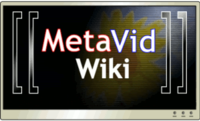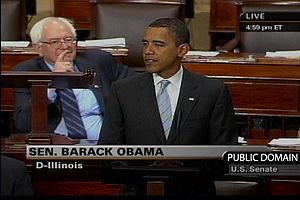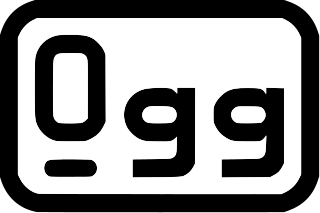
Ogg is a free, open container format maintained by the Xiph.Org Foundation. The authors of the Ogg format state that it is unrestricted by software patents and is designed to provide for efficient streaming and manipulation of high-quality digital multimedia. Its name is derived from "ogging", jargon from the computer game Netrek.

Synchronized Multimedia Integration Language ) is a World Wide Web Consortium recommended Extensible Markup Language (XML) markup language to describe multimedia presentations. It defines markup for timing, layout, animations, visual transitions, and media embedding, among other things. SMIL allows presenting media items such as text, images, video, audio, links to other SMIL presentations, and files from multiple web servers. SMIL markup is written in XML, and has similarities to HTML.

Vorbis is a free and open-source software project headed by the Xiph.Org Foundation. The project produces an audio coding format and software reference encoder/decoder (codec) for lossy audio compression, libvorbis. Vorbis is most commonly used in conjunction with the Ogg container format and it is therefore often referred to as Ogg Vorbis.
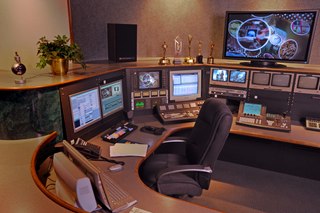
Non-linear editing is a form of offline editing for audio, video, and image editing. In offline editing, the original content is not modified in the course of editing. In non-linear editing, edits are specified and modified by specialized software. A pointer-based playlist, effectively an edit decision list (EDL), for video and audio, or a directed acyclic graph for still images, is used to keep track of edits. Each time the edited audio, video, or image is rendered, played back, or accessed, it is reconstructed from the original source and the specified editing steps. Although this process is more computationally intensive than directly modifying the original content, changing the edits themselves can be almost instantaneous, and it prevents further generation loss as the audio, video, or image is edited.
Cable-Satellite Public Affairs Network is an American cable and satellite television network, created in 1979 by the cable television industry as a nonprofit public service. It televises proceedings of the United States federal government and other public affairs programming. C-SPAN is a private, nonprofit organization funded by its cable and satellite affiliates. It does not have advertisements on any of its television networks or radio stations, nor does it solicit donations or pledges on-air. However their official website has banner advertisements, and streamed videos also have advertisements. The network operates independently; the cable industry and the U.S. Congress have no control over its programming content.

MediaWiki is free and open-source wiki software originally developed by Magnus Manske for use on Wikipedia on January 25, 2002, and further improved by Lee Daniel Crocker, after which development has been coordinated by the Wikimedia Foundation. It powers several wiki hosting websites across the Internet, as well as most websites hosted by the Wikimedia Foundation including Wikipedia, Wiktionary, Wikimedia Commons, Wikiquote, Meta-Wiki and Wikidata, which define a large part of the set requirements for the software. Besides its usage on Wikimedia sites, MediaWiki has been used as a knowledge management and content management system on websites such as Fandom, wikiHow and major internal installations like Intellipedia and Diplopedia.

Geotagging, or GeoTagging, is the process of adding geographical identification metadata to various media such as a geotagged photograph or video, websites, SMS messages, QR Codes or RgSSfeeds and is a form of geospatial metadata. This data usually consists of latitude and longitude coordinates, though they can also include altitude, bearing, distance, accuracy data, and place names, and perhaps a time stamp.
Microformats (μF) are predefined HTML markup created to serve as descriptive and consistent metadata about elements, designating them as representing a certain type of data. They allow software to process the information reliably by having set classes refer to a specific type of data rather than being arbitrary.
A video search engine is a web-based search engine which crawls the web for video content. Some video search engines parse externally hosted content while others allow content to be uploaded and hosted on their own servers. Some engines also allow users to search by video format type and by length of the clip. The video search results are usually accompanied by a thumbnail view of the video.
A semantic wiki is a wiki that has an underlying model of the knowledge described in its pages. Regular, or syntactic, wikis have structured text and untyped hyperlinks. Semantic wikis, on the other hand, provide the ability to capture or identify information about the data within pages, and the relationships between pages, in ways that can be queried or exported like a database through semantic queries.

Semantic MediaWiki (SMW) is an extension to MediaWiki that allows for annotating semantic data within wiki pages, thus turning a wiki that incorporates the extension into a semantic wiki. Data that has been encoded can be used in semantic searches, used for aggregation of pages, displayed in formats like maps, calendars and graphs, and exported to the outside world via formats like RDF and CSV.
RDFa or Resource Description Framework in Attributes is a W3C Recommendation that adds a set of attribute-level extensions to HTML, XHTML and various XML-based document types for embedding rich metadata within Web documents. The Resource Description Framework (RDF) data-model mapping enables its use for embedding RDF subject-predicate-object expressions within XHTML documents. It also enables the extraction of RDF model triples by compliant user agents.
Semantic publishing on the Web, or semantic web publishing, refers to publishing information on the web as documents accompanied by semantic markup. Semantic publication provides a way for computers to understand the structure and even the meaning of the published information, making information search and data integration more efficient.
Geospatial metadata is a type of metadata applicable to geographic data and information. Such objects may be stored in a geographic information system (GIS) or may simply be documents, data-sets, images or other objects, services, or related items that exist in some other native environment but whose features may be appropriate to describe in a (geographic) metadata catalog.

Metadata is "data that provides information about other data", but not the content of the data itself, such as the text of a message or the image itself. There are many distinct types of metadata, including:
Liquid Audio Inc was a US software company based in Redwood City, California.

Floor Services Chief is the title of the staff member in the speaker's or majority leader's office who runs the majority cloakroom in the United States House of Representatives. The current floor services chief for the Republican Cloakroom is Timothy J. Harroun, appointed by Republican Speaker John Boehner. The Democratic floor chief is Barry K. Sullivan, who was appointed by Democratic Speaker Nancy Pelosi. Sullivan's predecessor was Donald Anderson, who was appointed by Speaker Thomas P O'Neill. When Harroun is floor services chief, Sullivan is minority cloakroom manager. Similarly, when Sullivan was floor services chief, Harroun was minority cloakroom manager.
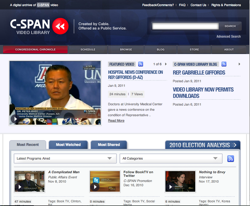
C-SPAN Video Library is the audio and video streaming website of C-SPAN, the American legislative broadcaster. The site offers a complete, freely accessible archive going back to 1987. It was launched in March 2010, and was integrated into the main C-SPAN website in 2013.
Multimedia information retrieval is a research discipline of computer science that aims at extracting semantic information from multimedia data sources. Data sources include directly perceivable media such as audio, image and video, indirectly perceivable sources such as text, semantic descriptions, biosignals as well as not perceivable sources such as bioinformation, stock prices, etc. The methodology of MMIR can be organized in three groups:
- Methods for the summarization of media content. The result of feature extraction is a description.
- Methods for the filtering of media descriptions
- Methods for the categorization of media descriptions into classes.
An online video platform (OVP) enables users to upload, convert, store, and play back video content on the Internet, often via a private server structured, large-scale system that may generate revenue. Users will generally upload video content via the hosting service's website, mobile or desktop application, or other interfaces (API), and typically provides embed codes or links that allow others to view the video content.
